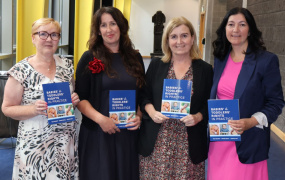Mathematics & Computer Studies
About
This department was founded in Mary Immaculate College in 1975 to provide a subject programme in Mathematics for the newly established Bachelor of Education degree. Today, the Department of Mathematics & Computer Studies continues to offer specialized elective Mathematics modules for the B Ed degree as well as undergraduate Mathematics modules for the BA (Liberal Arts) and the BA in Education (post-primary teaching).
The name was changed to its present form in 1987 to reflect the involvement of the department in Computer Studies courses for all students and in a number of action-research projects on the applications of computers in education. We offer first year BA students a Computer Skills unit within their Skills for Study and Work and in second year, we offer BA Elective modules through which students may further advance their knowledge and skills in the area of Information Technology.
Postgraduate research opportunities are also available in mathematics for MA and PhD degrees.
After the 2016 incorporation by MIC of St Patrick’s College, Thurles, the department started in 2019 offering undergraduate modules in Mathematics, as part of two concurrent BA in Education (post-primary teaching) programmes offered at MIC, St Patrick's Campus, Thurles.
Undergraduate Teaching
Limerick Campus - Mathematics
Broadly speaking, mathematics is the study of quantities and hidden structures through analysis, deduction and calculation. A maths degree should give you the basic ideas of pure and applied mathematics (number theory, linear and abstract algebra, geometry, calculus, computational mathematics, etc), and of probability and statistics.
Maths modules in the BA (MI002)
Maths elective modules in the BEd (MI004/MI005/MI006)
Mathematics Learning Hub
In conjunction with the Academic Learning Centre a Mathematics Learning Hub (MLH) has been established. The MLH will provide a space where you can meet like-minded friendly people, where you can talk about any aspects of mathematics and your learning of it, and where you can discuss any questions you may have in an individual or small-group setting. The Mathematics Learning Hub is coordinated by Bernd Kreussler (Email: Bernd.Kreussler@mic.ul.ie), from whom further details may be obtained.
Limerick Campus - Information Technology
We provide Information Technology modules for Students of Psychology in the BA (MI002) or BSc (MI003) as well as elective modules for all BA students in their second year. Taking these modules, students develop a competence in the use of Information and Communication Technologies (ICT) tools to enhance their use of ICT in college and their working life. Participants will be provided with the knowledge, understanding, skills and competencies that allows them to adapt to a world of continuous technological innovations.
Thurles Campus - Mathematics
Postgraduate Studies
MA and PhD in Mathematics at MIC
The Department of Mathematics and Computer Studies at Mary Immaculate College invites applications from graduates who wish to pursue postgraduate research in Mathematics for an MA or PhD thesis. Mathematics Education related options are available as well.
Requirements
General requirements and regulations follow those set out by the University of Limerick.
While, in general, the minimum entry requirement for students who wish to pursue postgraduate studies by research and thesis is a second-class honours (grade two) at undergraduate level, it is likely that successful candidates will have a 2.1 honours degree or higher. However, the most important prerequisite is a strong interest in the subject, independent of previous academic awards.
Well-qualified and highly-motivated graduates are encouraged to proceed by research and thesis to M.A. and Ph.D. levels of postgraduate study in all areas represented in this department.
How to Apply
If you are thinking about postgraduate studies as an option for you, don't hesitate to talk to a member of the Department of Mathematics and Computer Studies.
Departmental Assistantships 2025 - Applications Closed
The Department of Mathematics and Computer Studies is no longer accepting applications from potential research MA/PhD students for one funded Departmental Assistantship beginning immediately. New applications can be made in Spring 2026. Information will be updated accordingly closer to that time.
General information on the Departmental Assistantship and other funding schemes at MIC
Please note that the application deadline for the MIC Doctoral Award, Doctoral Studentship and the Postgraduate Studentship was Friday, 25 April 2025.
The deadline for the Departmental Assistantship was 16 May 2025. Applicants should identify a research topic and contact a potential supervisor, and complete a research postgraduate application.
Scholarship Information and Research Area Details
For further information, please contact Bernd Kreussler, Head of Department (Bernd.Kreussler@mic.ul.ie).
Staff
Research
Research activities of department members cover the following areas.
Mathematics
- Moduli spaces of vector bundles and principal bundles over algebraic varieties. (Stephen Coughlan)
- Classification and moduli of projective algebraic varieties. (Norbert Hoffmann)
- Structure of twistor spaces; Stability conditions on triangulated categories. (Bernd Kreussler)
- Operator algebras with a focus on non-commutative probability. (Arundhathi Krishnan)
- Operator theory; discrete geometry; combinatorics. (Derek Kitson)
- Combinatorial and algebraic structures arising from alternating sign matrices. (Cian O'Brien)
Mathematics Education
- Mathematics curriculum change at secondary level; teaching and assessment methods in tertiary level mathematics; STEM Education. (Paraic Treacy)
- The impact of teacher collaboration with mathematics educators in higher level education within Lesson Study; Assessing quality of secondary-level mathematics textbooks. (Ronan Flatley)
Computer Studies
- Pedagogical strategies that utilise ICT to enhance Teaching and Learning; Self-Regulated Learning, Learning Agility, Learning Design, Investigating Digital Agility; Digital Frameworks and Development of a digital skills framework for students. (Niamh Armstrong)
Maths Enrichment
Academic mathematicians from UL and MIC help interested secondary school students to deepen their understanding of mathematics, improve their problem-solving skills and prepare them for participation in Mathematical Olympiads.
- About
- Undergraduate Teaching
- Postgraduate Studies
- Staff
- Research
- Maths Enrichment
- Visit MIC Insights











